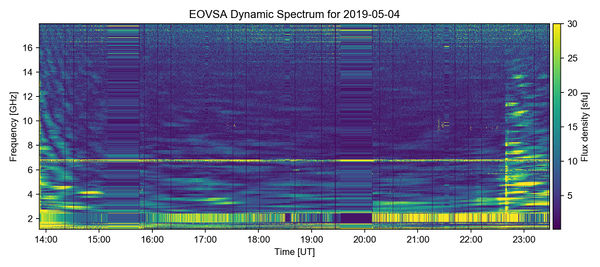EOVSA Data Products: Difference between revisions
| Line 7: | Line 7: | ||
==Level 1 - Calibrated visibility data== | ==Level 1 - Calibrated visibility data== | ||
Level 1 data have all of the required content to produce Level 2 data products | Level 1 data have all of the required content to produce Level 2 data products | ||
===[[ | ===[[http://www.ovsa.njit.edu/fits/UDBms_slfcaled#CASA 1-min averaged ms ]]=== | ||
===CASA Event ms=== | ===CASA Event ms=== | ||
Revision as of 15:05, 23 March 2020
Welcome to the EOVSA data products documentation. EOVSA observes the full disk of the Sun at all times when the Sun is >10 degrees above the local horizon, which is season dependent and ranges from 7-12 hours duration centered on 20 UT. During January, coverage will be 16-24 UT daily, 7 days/week. EOVSA will provide microwave spectra and imaging at up to 451 frequencies between 1 and 18 GHz. We deliver the radio interferometry data in level 0-2.
Data Definition
Level 0 - Raw visibility data from the instrument
Level 1 - Calibrated visibility data
Level 1 data have all of the required content to produce Level 2 data products
[1-min averaged ms ]
CASA Event ms
Level 2 - Images and spectrogram data in standard FITS format
All-day TP spectrum
Daily total power full-Sun-integrated spectrogram calibrated in solar flux units are provided at 451 frequencies and 1 s time resolution.
All-day XP spectrum
Daily cross power spectrogram (mean flux from baselines with "intermediate" lengths) calibrated in solar flux units are provided at 451 frequencies and 1 s time resolution. XP spectrogram has much better sensitivity to weak bursts.
Synoptic 6-band Images
Full disk images at 6 selected frequency bands centered at 1.4, 3.0, 4.5, 6.8, 10.2, and 13.9 GHz are provided once per day, calibrated in brightness temperature.



